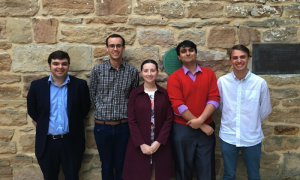An evening with the interns
An evening with the Interns
Our five current interns gave diverting and relevant valedictory addresses to an engaged audience at Glover Cottages on Tuesday 29 November 2016.
Yemen: the new forgotten war
Harrison Howard spoke about the under-reported but tragic conflict in Yemen. With 24 million people, it is the poorest of Arab countries and one of the least well-managed. Protests against the kleptocracy of President Abdrabbuh Mansur Hadi began in 2011 during the so-called Arab Spring. Houthi forces loyal to former President Ali Abdullah Saleh rose against him and by 2015 controlled Sana’a, the country’s largest city to the country’s centre west. Saleh and his government moved to Aden in the south. On the tenuous grounds that the Houthi are financially and militarily supported by Iran (Houthi and Iranians are both Shia), Saudi Arabia and the United States both support Hadi. Saudi fighter bombers and US drones have blitzed Sana’a without dislodging the Houthi. To add to the misery of the people, Al Qaeda and ISIL both have forces there. Between March 2015 and August 2016, at least 10,000, mainly civilians, have been killed in the conflict. Apart from conflict, the country lacks water for its crops, and may become the first in the Middle East to run out altogether.
The Speed of Lies
Zia Khan spoke about democracy in the age of new media. The Internet allows the dissemination of information to millions within seconds. ‘Click bait’ is seductive and spreads propaganda further. In November’s US presidential elections, Hillary Clinton outgunned Trump in media resources, but Trump still won because of wide-spread distrust among his supporters, especially younger ones, with conventional media. Amplified by social media, lies spread, and were believed, including one circulated by Trump supporters that Pope Francis endorsed Trump as president. It has become all too easy to propagate lies and misinformation this way. The European Union has set up a task force to counter lies in the media. But their effect in a world of fear, suspicion and willingness to believe any rumour that comes along makes their task almost impossible. As a result, even the most carefully and honestly prepared campaign for support by candidates in elections can be overturned or disregarded by countervailing propaganda. Democracy and good government become the victims.
Looking beyond Climate Change
Natalie Kutcher asserted that international conferences setting carbon dioxide emission targets to reduce man-made global warming have become utterly ineffective. Geo-engineering could however intervene to save the planet. Technologies could be developed either to suck carbon dioxide out of the atmosphere, or reduce the amount of the sun’s rays reaching the earth. Technologies to remove carbon dioxide include planting artificial trees and/or seeding the ocean floor with iron to increase phytoplankton blooms which absorb carbon dioxide. Such experiments have already begun in the ocean deltas of some rivers of Argentina. Obstructing or reducing solar radiation could be achieved by sending giant sun shades into geo-stationary orbits, spraying clouds with sea water to make them whiter and more reflective, or whitening the roofs of houses and roads in urban complexes to increase reflectivity and reduce the capacity for heat-absorption by man-made structures. Whatever courses of action are taken, warned Natalie, we can expect a host of unprecedented ethical, environmental and political dilemmas to arise.
Nuclear waste – the case for South Australia
Hugh Piper said that South Australia’s recent Royal Commission had presented a good case for developing an international storage regime for the world’s spent nuclear fuel. The State has an abundance of geologically stable and under-populated land. Australia enjoys stable government and the rule of law, making it difficult for corruption to weaken a regime of strict safeguards that would have to be put in place to prevent theft or misplacement of the waste. The material would have to be stored above ground for 40 years and then buried irrecoverably in deep trenches for the thousands of years necessary for the wastes to lose its radio-toxicity. An opinion poll conducted by the ABC in country South Australia indicated that a big majority – 80 percent – opposed the regime. But there were many business people who favoured it. The State Premier Jay Wetherill favoured the scheme and has promised a referendum, but local sensitivities, not least among indigenous Australians, will probably re-inforce public opposition to it.
Australia’s Response to Chinese Assertiveness: a step by step guide
Ben Robbins proposed a four-step approach by Australia towards Chinese assertiveness in the South China Sea that goes beyond simply (and rather passively) asserting that it won’t take sides. First, the RAAF should continue its long-established routine overflights to provide intelligence and emphasise that Australia is not intimidated by China’s territorial claims. Second, Australia should clear up its own litigious maritime dispute (and its own conscience) with Timor Leste so as not to be distracted by any counter accusations China might make. Third, It should take a pragmatic diplomatic approach by emphasising its own legitimate traditional interests in the area. Fourth, it should develop in close consultation with its South East Asian neighbours a commonly-agreed code of conduct which could be presented to China. What Australia should not do, according to Ben, would be to conduct so-called freedom of navigation exercises with the United States Navy, which would be sure to antagonise Beijing and make a durable modus operandi difficult to achieve.
Report by Richard Broinowski
